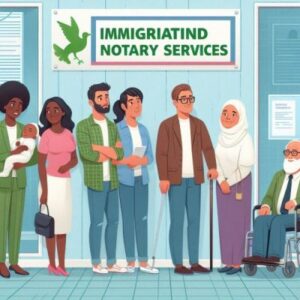Immigration and Notary Language Translation

Introduction- Immigration and notary language translation is vital for individuals and businesses dealing with legal and official documents in different languages. These services ensure that all necessary documents are accurately translated to meet legal and regulatory requirements, facilitating smooth immigration processes and legal transactions.
Understanding Immigration and Notary Language Translation Services
Immigration and notary translation services involve translating legal and official documents such as visas, passports, birth certificates, marriage certificates, legal contracts, and affidavits. These translations must be precise, certified, and often notarized to be accepted by government agencies and legal entities.
Importance of Immigration and Notary Language Translation Services
- Legal Compliance: Ensures that translated documents meet legal and regulatory standards.
- Accuracy: Provides precise translations that preserve the original meaning and context.
- Confidentiality: Maintains the privacy and security of sensitive information.
- Official Acceptance: Ensures that translated documents are accepted by government and legal entities.
- Smooth Processes: Facilitates seamless immigration processes and legal transactions.
Types of Documents Translated
- Personal Documents:
- Birth certificates
- Marriage certificates
- Divorce decrees
- Passports
- Visas
- Legal Documents:
- Contracts and agreements
- Affidavits
- Court orders
- Power of attorney
- Property deeds
- Educational Documents:
- Academic transcripts
- Diplomas and certificates
- Enrollment letters
- Recommendation letters
- Student visas
- Business Documents:
- Incorporation documents
- Tax filings
- Employment contracts
- Financial statements
- Business licenses
- Other Official Documents:
- Medical records
- Police clearances
- Insurance policies
- Wills and testaments
- Immigration forms
Process of Immigration and Notary Language Translation
- Initial Consultation:
- Understanding client requirements and target languages
- Analyzing the documents to be translated
- Estimating time and cost
- Translation:
- Assigning the project to skilled translators with expertise in the relevant languages
- Ensuring accurate and culturally appropriate translations
- Certification and Notarization:
- Certifying the translated documents
- Notarizing the translations to meet legal requirements
- Quality Assurance:
- Reviewing and proofreading the translated documents for accuracy and consistency
- Correcting any errors or inconsistencies
- Delivery:
- Providing the final translated, certified, and notarized documents to the client
- Offering post-delivery support if needed
Choosing an Immigration and Notary Language Translation
- Experience and Expertise:
- Look for providers with a proven track record in immigration and notary translation
- Ensure they have expertise in the relevant languages and legal fields
- Language Proficiency:
- Ensure translators are native speakers or have near-native proficiency in the target languages
- Cultural Sensitivity:
- Verify that the provider understands cultural nuances and regional differences
- Confidentiality:
- Ensure the provider has measures in place to protect sensitive information
- Client Reviews and Testimonials:
- Read reviews and testimonials from previous clients to gauge satisfaction levels
Tools and Technologies in Immigration and Notary Language Translation
- Translation Memory (TM):
- A database that stores previously translated segments for reuse, improving consistency and efficiency
- Computer-Assisted Translation (CAT) Tools:
- Software that assists translators by organizing and managing translation projects
- Terminology Management:
- Tools that ensure consistent use of terminology across documents
- Quality Assurance (QA) Tools:
- Software that checks for errors and inconsistencies in translated documents
- Secure Communication Platforms:
- Utilizing encrypted communication channels for sending and receiving sensitive documents
Benefits of Immigration and Notary Language Translation
- Enhanced Communication: Facilitates clear and effective communication with government and legal entities.
- Legal Compliance: Ensures documents meet all necessary legal requirements.
- Cultural Relevance: Adapts content to fit cultural contexts and avoid miscommunication.
- Confidentiality: Protects sensitive information from unauthorized access.
- Efficiency: Streamlines the translation process to meet deadlines without compromising quality.
Common Challenges in Immigration and Notary Language Translation
- Complex Terminology: Managing legal and technical terms and jargon.
- Cultural Differences: Adapting content to suit different cultural norms and expectations.
- Maintaining Accuracy: Ensuring precision and avoiding misunderstandings.
- Tight Deadlines: Delivering high-quality translations within short time frames.
- Confidentiality Concerns: Protecting sensitive information from unauthorized access.
Applications of Immigration and Notary Translation
- Immigration Applications:
- Visas and work permits
- Residency applications
- Citizenship applications
- Family reunification documents
- Legal Proceedings:
- Court hearings
- Legal consultations
- Arbitration and mediation
- Affidavits and sworn statements
- Business Transactions:
- International contracts
- Business agreements
- Intellectual property documents
- Tax filings and audits
- Educational Purposes:
- Student visa applications
- Academic transcripts and diplomas
- Enrollment documents
- Scholarship applications
- Personal Matters:
- Marriage certificates
- Birth certificates
- Divorce decrees
- Adoption papers
Conclusion
Immigration and notary translation services are essential for ensuring accurate and effective communication in legal and official matters. By choosing a reputable translation provider with expertise in the relevant fields, individuals and businesses can overcome language barriers and achieve their goals. Leveraging modern translation tools and technologies further enhances the efficiency and quality of translations, making it easier to meet the demands of a global audience
